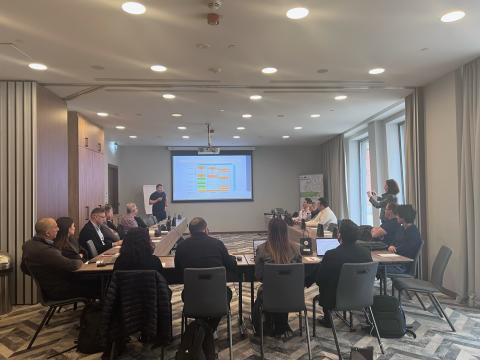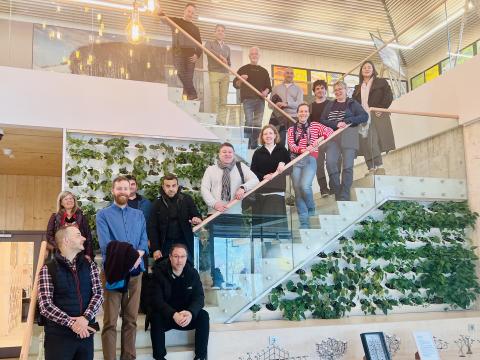Key Outcomes from the 3rd Interregional Event in Riga
The 3rd Interregional event took place on April 16th and 17th, 2024, in Riga, Latvia. It was hosted by Riga Planning Region and co-organized with the project lead, AGENEX. The first day was devoted to presentations and discussions, while the second day was reserved for site visits to innovative energy projects.
Enabling conditions for energy communities in Latvia
Within the ShareRES project, Riga Planning Region cooperates with the national ministry, municipalities, and other key stakeholders to promote a public consultation process that leads to improved sectoral and regional policies and contributes to the launch of new energy community initiatives.
The Ministry of Climate and Energy is directly responsible for developing the legal framework for the operation of energy communities in Latvia. Gunārs Valdmanis, the Director of the Energy Market Department, presented the government’s approach to energy sharing, active customers, and the net settlement scheme, and briefly explained the forthcoming regulations from the Cabinet of Ministers. The regulation was officially submitted for public consultation in the spring of 2024.
Next, Valdis Ratniks from the Riga Energy Agency reported on the renewable energy and climate change mitigation activities carried out by the municipality of Riga, including sustainable transport, energy efficiency, and the introduction of renewable energy sources. The agency advises local decision-makers and residents on sustainability issues. Valdis also answered questions from the audience and elaborated on some specific activities that the Riga Energy Agency implements to strengthen cooperation with resident communities.
The final presentation was given by Oļegs Borščevskis from the Institute of Physical Energetics, who provided an overview of the potential of energy communities for residential buildings. He presented models developed by the institute's researchers that include not only an evaluation of the legal restrictions for implementing energy community projects but also demonstrate the technical solutions possible for clusters of single-family homes, terraced houses, and multi-apartment residential buildings.
The main conclusion was that Latvia has sufficiently strong prerequisites (a legal framework and a metering system for electricity production and consumption) for the development of sustainable energy communities. After the approval of the new regulations by the Cabinet of Ministers, expected by the end of 2024, it will be possible to start implementing the first community energy projects.

Site visits to sustainable energy projects in Salaspils, Ogre and Mārupe
The second day began with a site visit to the Salaspils Siltums district heating project. Salaspils Siltums, a municipal district heating company, has implemented a solar district heating system that is the largest in the Baltic region. At least 90% of the thermal energy is produced using only renewable energy resources—wood chips and solar energy. The project has received international recognition for its contribution to environmental sustainability.
The second site visit was to the Ogre Central Library, the largest public wooden structure in Latvia, which falls into the category of passive or zero-energy buildings. The building’s façade and interior prominently feature wood as the primary material used in its design. In 2023, the Ogre Central Library won the award for the most energy-efficient public building in Latvia. The structure is also notable for its carefully designed smart heating and cooling solution. A powerful water-to-air heat pump uses the city's sewage system as an energy source, with electricity provided by a system of solar panels, while rainwater supports the building's green ecosystem.
The third and final site visit took place in Mārupe Municipality. In cooperation with national energy policymakers and the ShareRES partner in Latvia, Riga Planning Region, the municipality initiated and, since 2020, has successfully implemented a small-scale community energy demonstration project at two multi-apartment buildings. The goal of the pilot project was to demonstrate how small-scale renewable energy communities can operate within the existing, underdeveloped regulatory framework. As Mārupe’s executive officer, Agnese Jankuna, noted, energy communities are an integral part of the municipality’s vision for sustainable urban development and renewable energy targets.

